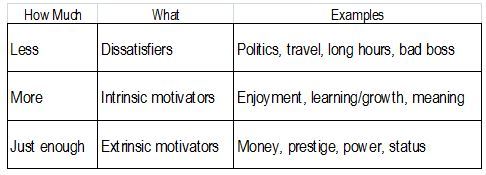In the 1970s, Dr. Douglas LaBier, a business psychologist and psychotherapist, conducted research on careers and motivations. LaBier was perhaps the first to recognize that the drive for success, and its criteria of money, power and prestige, exists alongside a parallel, but less visible, drive for increased fulfillment and meaning from work.
As LaBier noted,
I often found that people would want to talk about a gnawing feeling of wanting something more 'meaningful' from their work. They didn't have quite the right language back then to express what that would look like other than feeling a gap between their personal values and the trade-offs they had to make to keep moving up in their careers and companies.
As an executive recruiter and career advisor, I have one-on-one conversations with professionals about their jobs and careers. Most of them already have at least some of the money, power and prestige to which LaBier alludes. Like LaBier, I've also noticed that many professionals want to talk about the gnawing feeling of wanting something more. Yet, despite the fact that it's been over 40 years since LaBier began his research, many professionals still struggle to find the right language to articulate what it is they're looking for in their career.
To analyze what career success means to you, leverage this straightforward framework to think through what causes perpetual dissatisfaction and what really represents reward.
Get less of these things
There are things we want less of -- let's call them 'dissatisfiers.' They include long hours, long commutes, dysfunctional culture, a micromanaging boss, etc. Seems obvious, right? But here's the problem. We tend to diminish their importance when making important career decisions. We say to ourselves, "My new boss seems like a micromanager, but I'm sure I can work around that. Besides, I'll be getting a 20 percent salary increase and more responsibility." Occurring infrequently, dissatisfiers may matter little, but when they persist and worsen over time, they often lead to extreme job dissatisfaction.
Get more of these things
Minimizing dissatisfiers is important, but it seldom leads to a satisfying job. It just leads to a job that's not dissatisfying. Job satisfaction is more directly related to intrinsic rewards. The satisfaction you receive from solving a puzzle, playing a musical instrument or being a good parent are examples of intrinsic rewards. While there are many intrinsic rewards that can contribute to job satisfaction, there are three that provide the foundation for career success.
•Enjoyment. Do you like what you do each day? According to a Gallup survey, only 20 percent of people do. An enjoyable job provides you with activities that you enjoy performing on a daily basis. Sure, they'll be some bad days, but for the majority of the time you should be satisfied with the work itself. Chances are if you truly enjoy your job, you're pretty good at it.
•Learning and growth. For those who want more out of their careers, maximizing learning and growth opportunities are powerful strategies. If you're a knowledge worker in the 21st century, your value is largely a function of your 'career capital' - your experience, skills and abilities. Rather than pursuing jobs that maximize your short-term economic capital, look for the opportunities that maximize your long-term career capital.
•Impact and Meaning. Choose jobs that have meaning to you, and allow you to impact something you care about on a regular basis. You shouldn't expect to save the world from poverty or solve global climate change fresh out of college, but what you do should be meaningful to you in some way.
Get just enough of these things
Money, prestige, power, status and authority are examples of extrinsic rewards. Extrinsic rewards are not necessarily bad. They're especially useful for providing short-term motivation, but when it comes to extrinsic rewards, we want just enough of them. People who focus too much on extrinsic rewards are often left unfulfilled and wanting even more. On the other hand, people who completely ignore extrinsic rewards, especially ambitious people, often become bored and unhappy.
What does success mean to you?
Try using the above framework to begin developing your own definition of what career success means to you. Then, think about the best job you've ever had - what made it so good? Think about the worst job you've ever had -- what made it so bad? Think about your current job -- how does it stack up across the parameters of the framework? Most important, think about your next job -- how will you decide what's most important to you?
